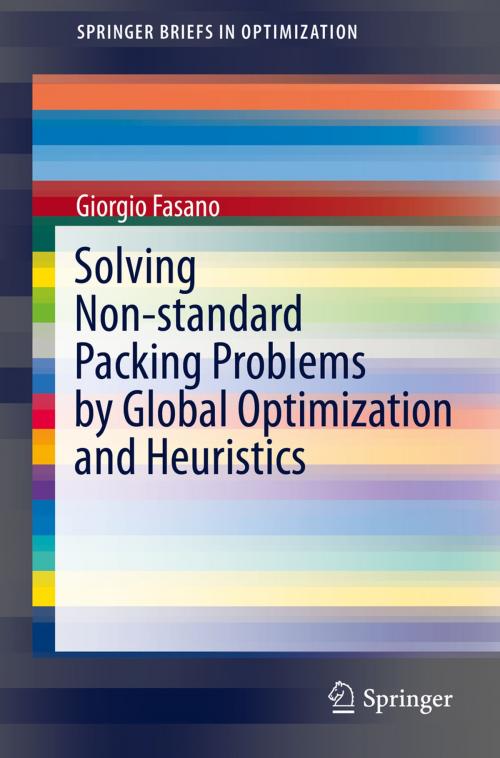Solving Non-standard Packing Problems by Global Optimization and Heuristics
Nonfiction, Science & Nature, Mathematics, Calculus, Applied| Author: | Giorgio Fasano | ISBN: | 9783319050058 |
| Publisher: | Springer International Publishing | Publication: | April 21, 2014 |
| Imprint: | Springer | Language: | English |
| Author: | Giorgio Fasano |
| ISBN: | 9783319050058 |
| Publisher: | Springer International Publishing |
| Publication: | April 21, 2014 |
| Imprint: | Springer |
| Language: | English |
This book results from a long-term research effort aimed at tackling complex non-standard packing issues which arise in space engineering. The main research objective is to optimize cargo loading and arrangement, in compliance with a set of stringent rules. Complicated geometrical aspects are also taken into account, in addition to balancing conditions based on attitude control specifications.
Chapter 1 introduces the class of non-standard packing problems studied. Chapter 2 gives a detailed explanation of a general model for the orthogonal packing of tetris-like items in a convex domain. A number of additional conditions are looked at in depth, including the prefixed orientation of subsets of items, the presence of unusable holes, separation planes and structural elements, relative distance bounds as well as static and dynamic balancing requirements. The relative feasibility sub-problem which is a special case that does not have an optimization criterion is discussed in Chapter 3. This setting can be exploited by introducing an ad hoc objective function, aimed at facilitating the finding of integer-feasible solutions. The third chapter also discusses the issue of tightening the general MIP model by introducing valid inequalities. A MIP-based heuristic approach is developed in Chapter 4, where the basic concept of abstract configuration is presented. Chapter 5 is devoted to experimental results relevant to a real-world application framework. Chapter 6 adopts both extensions of the general MIP model and non-linear formulations to tackle two further non-standard packing issues. The final Chapter 7 presents conclusions and provides insights regarding prospective developments (including non-standard scheduling aspects).
Practitioners and researchers interested in advanced optimization model development and solution in the context of logistics, transportation systems, complex structures, manufacturing and electronics will find this book useful. The book can also be used in graduate courses on nonlinear - including global and mixed integer - optimization, as a valuable collection of practically meaningful object packing applications.
This book results from a long-term research effort aimed at tackling complex non-standard packing issues which arise in space engineering. The main research objective is to optimize cargo loading and arrangement, in compliance with a set of stringent rules. Complicated geometrical aspects are also taken into account, in addition to balancing conditions based on attitude control specifications.
Chapter 1 introduces the class of non-standard packing problems studied. Chapter 2 gives a detailed explanation of a general model for the orthogonal packing of tetris-like items in a convex domain. A number of additional conditions are looked at in depth, including the prefixed orientation of subsets of items, the presence of unusable holes, separation planes and structural elements, relative distance bounds as well as static and dynamic balancing requirements. The relative feasibility sub-problem which is a special case that does not have an optimization criterion is discussed in Chapter 3. This setting can be exploited by introducing an ad hoc objective function, aimed at facilitating the finding of integer-feasible solutions. The third chapter also discusses the issue of tightening the general MIP model by introducing valid inequalities. A MIP-based heuristic approach is developed in Chapter 4, where the basic concept of abstract configuration is presented. Chapter 5 is devoted to experimental results relevant to a real-world application framework. Chapter 6 adopts both extensions of the general MIP model and non-linear formulations to tackle two further non-standard packing issues. The final Chapter 7 presents conclusions and provides insights regarding prospective developments (including non-standard scheduling aspects).
Practitioners and researchers interested in advanced optimization model development and solution in the context of logistics, transportation systems, complex structures, manufacturing and electronics will find this book useful. The book can also be used in graduate courses on nonlinear - including global and mixed integer - optimization, as a valuable collection of practically meaningful object packing applications.















